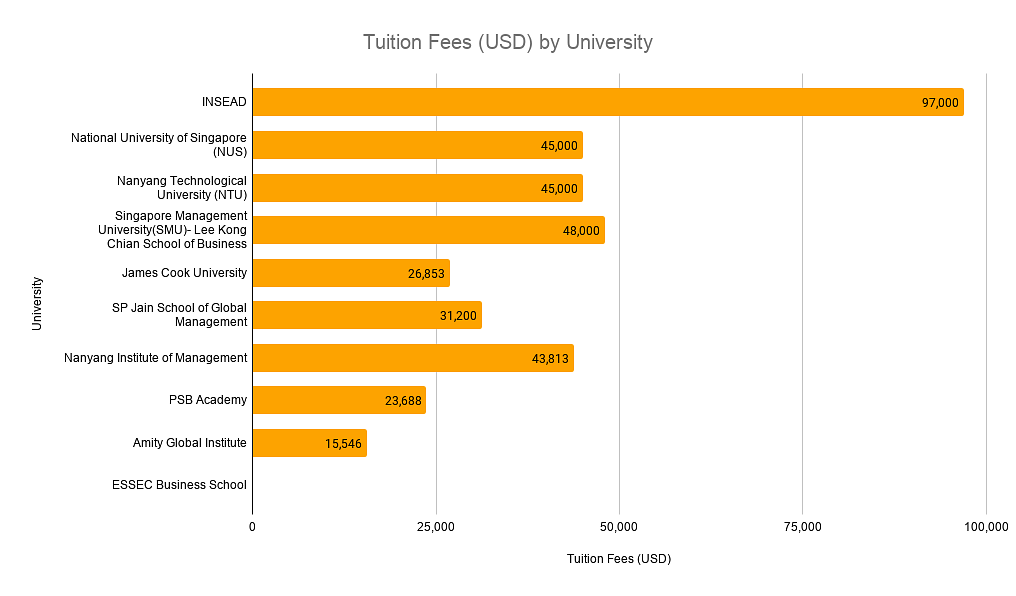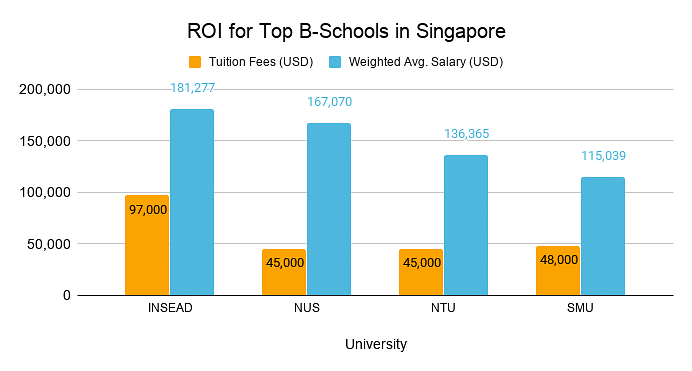MBA in Singapore is a flexible 1.5-2 year program costing around 60,000 USD to 90,000 USD to international students. This for Indian students estimates up to 65 lakhs. For those looking forward to pursuing an MBA degree from Singapore, having around 80% scores in their bachelor’s, TOEFL score (92-100 or other equivalents), and GMAT/GRE results (optional for some universities) is important. Often the work experience requirement is posed by only a handful of MBA universities in Singapore.
Applicants must ensure that applications for MBA courses are sent within admission deadlines for Singaporean universities to be left with enough time to procure a student visa. With minimal admission requirements and an affordable MBA degree, Singapore has risen on the charts of popular destinations for the course among international applicants. Establishing its rich potential as a gateway to markets in Asia-Pacific and an overseas presence, Singapore offers ample job opportunities with a number of the world’s leading businesses. After completion of the degree, with MBA jobs in Singapore, one can expect to make up to 90,000 to 180,000 USD a year.
MBA in Singapore Top Colleges
Master of Business Administration (MBA) is an internationally recognized degree course that trains you on the skills required for business management and administration. The top business schools in Singapore offering MBA are tabulated below with their rankings and program durations:
| University | Program Duration | Tuition Fees (USD) |
|---|---|---|
| INSEAD Asia Campus | 10 Months | 90,910 |
| National University of Singapore (NUS) | 17 months | 59,114 (FT) |
| Nanyang Technological University (NTU) | 12 months | 45,751 |
| Singapore Management University(SMU) – Lee Kong Chian School of Business | 1 year(10 weeks internship) | 49,435 |
| James Cook University | 16 months | 27,569 |
| SP Jain School of Global Management | 16 months | 29,438 |
| Nanyang Institute of Management | 1 year | 28,027 |
| PSB Academy | 16 months | 19,302 |
| Amity Global Institute | 1 year | 15,491 |
| ESSEC Business School | 1 year | 48,652 |
NUS offers specialized management programs for students with an engineering background to learn and continue in fields related to their previous studies. With some popular business schools offering MBA programs with global standing, Singapore is now catching up with the race of becoming a heavy-selling MBA brand.
Best Executive MBA in Singapore
Executive MBA is a professional degree offered to executives and professionals who wish to add educational value to their pre-existing experience and learning. Some of the famous B-schools for their Executive MBA in Singapore are as follows:
| University | Program & Duration | Approx Tuition (USD) |
|---|---|---|
| NUS | UCLA-NUS Executive MBA (15 months) | 118,080 |
| NUS Executive MBA (15 months) | 80,984 | |
| INSEAD | Global Executive MBA (14-17 months) | 140490 |
| Tsinghua INSEAD Executive MBA | 88026 | |
| SMU | SMU Executive MBA | 82132 |
Why Study MBA in Singapore?
- Singapore is a country that lays a lot of importance on the education sector with 19.96% of its total expenditure invested on Education out of which 35.28% invested in higher education.
- It also holds home to five of the best universities in Asia according to the Times Higher Education World University Rankings
- The National University of Singapore and Nanyang Technological University at no.1 and no.5 respectively.
- Many private universities like INSEAD, James Cook University, MDIS, SP Jain School of Global Management are among the top universities globally.
- Four business schools in Singapore were recognized by Financial Times Global Rankings-2020
- This includes INSEAD, NUS, Nanyang Business School, and SMU
- Studies say that in 2019, MBA enrolment at Singaporean business schools shot up to 3,531 blooming with international students from China, Vietnam, and India.
- Many universities in Singapore have tie-ups with foreign universities, inviting students from across 30 countries around the globe.
Admissions to MBA in Singapore
MBA courses in Singapore are popular for their transformative and experiential learning making it popular among students. In the sections below, you will go through the overview of the admission process & requirements in Singapore and other details you must be aware of as an international student who wants to pursue studies in Singapore.
How to apply
Most universities have online application forms. The intake for aspirants for MBA happens in three months, September, October, and January. For most of the popular business schools in Singapore, the commencement of the MBA program is in April.
MBA in Singapore Deadlines
International students can send in their MBA applications by the following deadlines:
| Course | Deadlines |
|---|---|
| MBA at INSEAD | August 2023 Intake Round 1: 06 September 2022 August 2023 Intake Round 2: 15 November 2022 August 2023 Intake Round 3: 10 January 2023 August 2023 Intake Round 4: 07 March 2023 January 2024 Intake Round 1: 07 March 2023 January 2024 Intake Round 2: 18 April 2023 January 2024 Intake Round 3: 27 June 2023 January 2024 Intake Round 4: 08 August 2023 |
| MBA at NUS | Round 1: 31 October 2022 Round 2: 16 January 2023 (apply latest by Round 2 to be considered for scholarships) Round 3: 30 March 2023 |
| MBA at NTU | Round 1: 4 December Round 2: 15 March Round 3: 30 April |
| MBA at SMU | Round 1: 15 March Round 2: 15 July Round 3: 31 October |
| MBA at SP Jain | Augist 15 |
MBA in Singapore: Eligibility Criteria
When planning to study in Singapore, an applicant is required to fulfill certain requirements for successful admissions at popular business schools. Eligibility for MBA in Singapore includes the basic criteria that every applicant must fulfill for most of the business schools and university-specific criteria. The latter basically deals with the specific score requirements for pursuing MBA from a specific business school in Singapore.
General Eligibility Criteria
- Language Proficiency Tests- IELTS, TOEFL ( For non-native English speakers)
- GMAT/GRE scores, not mandatory
- A Bachelor’s degree in any field from any recognized university
- A minimum of 2.8 CGPA at the graduation level. This is equivalent to 83% or B grade.
- A minimum 2 years of working experience
Also Explore: GMAT Score for MBA in Singapore
University Specific Eligibility Criteria
tabulated below is the detail of specific scores and other additional eligibility that international students may have to fulfill for pursuing an MBA in Singapore
| University | Standardized Test Scores | ELP Test Scores | Application Portal |
|---|---|---|---|
| INSEAD | GMAT score required | TOEFL – 100, IELTS – 6.5, PTE-68 | Apply Here |
| NUS | GMAT: 600 | TOEFL cBT: 260, IELTS: 7.5 | Apply Here |
| Nanyang Technological University | GMAT: 600 | IELTS: 6.5, TOEFL: 100 | Apply Here |
| Singapore Management University | GMAT: 600 | TOEFL: 100, IELTS: 7.0 | Apply Here |
| James Cook University | GMAT preferred (No bar) | TOEFL iBT: 90, IELTS: 6.5 | Apply Here |
| SP Jain School of Global Management | GMAT: 650 | IELTS- 6.5, PTE-600 | Apply Here |
| Nanyang Institute of Management | GMAT: Required competitive score | IELTS: 6.0, TOEFL: 100 | Application Form |
| PSB Academy | GMAT preferred, 3 years work experience | TOEFL- 93, IELTS-6.5, PTE- 64 | Request Enquiry |
| Amity Global Institute | GMAT: 610 | TOEFL: 92, IELTS: 6.5 | Apply Here |
| ESSEC Business School | GMAT: Competitive (No bar) | TOEFL: 100, IELTS: 7.0 | Online Form |
Applicants must note that having previous work experience is always an added advantage when making applications. As GMAT and Work experience have a weightage of their own when admission decisions are made, it is always suggested to the applicants to ensure that these are not missed out while sending in their applications.
MBA in Singapore Requirements
The documents required when sending in your applications for Singaporean Universities and B-school are discussed below. For most of the documents, scanned copies can be sent along with the applications. Original documents may be required to be submitted at the time of enrollment with the university:
- Application fees Receipt
- Passport details
- Student Pass (for non – Singapore citizens)
- Past academic documents
- Tuition grant: if applied for any
- Financial aid applications
- Awards/ Recognitions/ co-curricular activities/ extracurricular activities/ competitions
- Criminal Offence records, if any
- Medical report stating any disability or illness
- Scores of tests are required for studying in Singapore.
MBA in Singapore Costs
The cost of study when studying abroad broadly comprises all your expenses from pre-departure to post-departure and tuition fees for an MBA in Singapore. Detailed below are the expenses an international student suffers when planning to study in Singapore. It is always preferred that student is familiar with the expenses and plans ahead of them, to ensure a smooth experience.
Pre-Departure Expense
These are mostly one-time expenses which include the cost of various application fees, like Singapore student visas, application fees of colleges, tests required to study in Singapore, etc. Some of these are listed below:
| Type of Expense | Cost (USD) |
|---|---|
| Visa Application Fees | 42 |
| IELTS Fees | 185-190 |
| TOEFL Fees | 160-250 |
| GRE Fees | 205-230 |
| GMAT Fees | 250 |
MBA in Singapore Fees
For MBA in Singapore, the fees range from 15,000 USD to 90,000 USD, depending on the university. The latest survey established by Singapore Business Review shows that on average, an MBA Degree in Singapore can cost you around 100,000 USD including tuition fees, accommodation, food, and entertainment.
A higher fee does not mean a higher quality of education. Many colleges with low fees provide a very high quality of education and vice versa. So, do not judge any course or university on the basis of the fees. Fees from some of the top universities are depicted in the image given below:

The cost of studying MBA in Singapore for Indian students will be approximately equal to 11 Lacs to 74 Lacs depending on the choice of the university.
Cost of Living in Singapore
After the admission process, once you arrive in Singapore to study there are living costs that you would like to consider. The cost of living in Singapore will depend on various factors. The average pocket pinch is tabulated below:
| Particulars | Average Monthly costs(USD) |
|---|---|
| Accommodation | 500-1400 |
| Travel | 100-200 |
| Food | 300-500 |
| Miscellaneous | 350-700 |
MBA in Singapore with Scholarships
There are 3 types of grants and scholarships for financing studies in Singapore, these are Government Scholarships, External Scholarships, and University-specific scholarships. Some of the popular scholarships in each category are explained below:
Government Grants
International students are eligible for grants. While they don’t have to repay the grants, students do have to sign a bond that requires them to work in Singapore for at least three years after graduation. Amount- Depends on the course fee and the amount of education loan taken by the student
External Scholarships for MBA in Singapore
Some of the scholarships you can avail while PG degree in Singapore are as follows:
- Singapore International Graduate Award(SINGA): It awards an amount of 1500 USD.
- The Financial Sumo Educational Scholarship Program: Amount awarded to international students 1000 USD.
- Central Sector Scheme of National Overseas Scholarship: Award amount is around 15400 USD.
- Go Clean Scholarship: Offering students an award of 3500 USD.
- BrokerFish International Student Scholarship: International students are awarded around 1000 USD under this scholarship.
- Global Study Awards: The amount offered to international students is 12,995 USD.
University – Specific scholarships for MBA in Singapore
Some of the top universities offer scholarships to international students pursuing MBA in Singapore. These are mentioned below:
- Lee Kong Chian Graduate Scholarships at NUS: Amount offered- 16000 USD
- INSEAD Antonio Borges Endowed Scholarship: Amount offered - 11,286 USD
- NUS MBA Study Awards: Plenty of MBA scholarships varying in amounts are offered by NUS
- Nanyang Scholarship: Amount- 6500 USD per year + full coverage of subsidized tuition fees
MBA in Singapore Scope
Having an employment rate of only 2.2%, Singapore offers employment opportunities to people all around the globe. On average, the business schools in Singapore have placement records of around 90%. Students get placed in companies like Microsoft, Dell, Boston Consulting Group, and many more. With an MBA degree from NSU Or INSEAD or the top business schools, you can get an average salary of 76,000 USD annually.
Also read: MBA Jobs in Singapore
ROI of MBA in Singapore
According to NUS( National University of Singapore) data, the average salary received ranges from 88,000 USD to 180,000 USD. The maximum placement being in Australia in sectors like Technology, Financial Services, Consulting.
For NTU(Nanyang Technological University), the average salary after 3years of work experience is 126,000 USD. Alumni from the university were able to secure job roles from around the world. Given below is a table detailing the percentage of alumni absorbed in job roles in various continents and countries.
| Continent/Country | Percentage of Alumni Placed |
|---|---|
| East Asia | 30 |
| Singapore | 37 |
| Europe | 12 |
| Southeast Asia | 9 |
| USA | 7 |
As per FT MBA Rankings are given below are the weighted salaries of the alumni of globally ranking business schools in Singapore compared with their tuition fees

The image suggests that the salaries offered to MBA graduates from Singapore are considerably good and the time of return on investment is also relatively less. Choosing MBA in Singapore over the USA/UK/India can be dependent on various factors, one of these is ROI. Though the USA is an economic powerhouse and makes offers better-paying jobs, the huge amount of tuition fees and stringent admission procedures make Singapore a better destination for study. Various top business schools ranking around the business schools of Singapore had lesser weighted salaries recorded of the alumni.
Reputed MBA institutions in India include IIMs which not only have a stringent admissions process but also require a high CAT score. With a huge number of applicants sitting for CAT, scoring an optimal score to make your way through IIMs is difficult. On the other hand, MBA in Singapore not only has a comparatively less stringent admissions policy but also has relatively lower requirements for various test scores. It also offers Indian students a chance of studying abroad and experience multi-cultural learning.
Jobs after MBA in Singapore
For planning a career post-degree you will require a work visa for Singapore. An MBA graduate in Singapore is mostly rewarded with various managerial job roles. Some of the popular job roles and average annual salaries offered in Singapore to MBA graduates have been discussed below:
| Job Designation | Average Annual Salaries (USD) |
|---|---|
| Business Consultant | 83,900 |
| Business Development Manager | 96,800 |
| Product Manager | 79,200 |
| General Manager | 104,500 |
| Accounting Manager | 92,600 |
| Asst. Business Development Manager | 74,300 |
| Manager | 112,200 |
Study Visa of Singapore
After receiving the offer letter from the business school you have applied for, you need to apply for a student pass to enter Singapore. Discussed below are the visa regulations and how you can apply for a Singapore study visa. The institute will file for the student pass for Indian application to Singapore Immigration and CheckPoint Authority(ICA). The fee for the student pass varies from college to college. Normally it takes a time period of 2-3 weeks for the documents to get processed and to get the Singapore student visa passes. In order to get the student pass you would need the following documents:
- Student Visa application Form-ICA form 16 and form V36
- Passport
- One Passport size photo( preferably the one in the passport)
- Visa application fee bill
- Transcripts (Mark sheets from class 10 to graduation)
- Affidavit of Support to be given by the sponsor on Rs.20 stamp paper(nonjudicial)
- Test scores that your college required, such as the TOEFL, IELTS
- Work experience Certificate
- Bank loan sanction letter(if necessary)
Some interesting aspects you can consider while applying for an MBA in Singapore are most universities have collaboration with local and international companies who organize business workshops and seminars. All MBA programs cover internships and work opportunities. Students are assigned team projects all across the semester which teach them to explore, develop managerial and organizational effectiveness and communication skills. The courses are well planned giving students opportunities to work for 16 hours approximately for their pocket money. An MBA from Singapore can offer you a hike of as much as 148% over your previous salaries, as per FT rankings.
FAQs
Ques. Is MBA in Singapore worth it?
Ans. The business schools in Singapore offer a wide variety of MBA courses including some specialized courses for students with a technical background. The flexible courses will give you time and the opportunity to work for some extra bucks. Singapore is a part of the four major economies, offer high employment opportunities post MBA
Ques. Is GMAT required for MBA in Singapore?
Ans. GMAT is not mandatorily required for pursuing MBA in Singapore. Many top-ranking universities skip the GMAT as one of the eligibility criteria. Instead, an applicant is required to have a minimum of 2 years of work experience and 2.5 to 2.8 CGPA.
Ques. How much does an MBA degree in Singapore cost?
Ans. The average fees range from 50,000 USD to 90,000 USD approximately, depending on the university and the course. This will be equivalent to 11 Lacs to 74 Lacs for an Indian student.
Ques. Which MBA is best in Singapore?
Ans. Some of the top-tiered universities for MBA in Singapore are National University of Singapore(NUS), INSEAD Business School, Nanyang Business School, and Singapore Management University. These universities rank globally among the top 100 as per FT Rankings
Ques. What is the eligibility for pursuing MBA in Singapore?
Ans. You must have a bachelor's degree in a relevant field, for top universities your score should be around 83% or more. GMAT scores (not mandatory) and work experience of around 3 years are also required.
Ques. Is NUS MBA good?
Ans. As one of the top-ranked business schools in Asia, NUS offers a tailored and highly transformative MBA program. The college does not only make it to QS rankings but also is recognized #15 position by Financial Times MBA global rankings.
Ques. Is NUS better than IIT?
Ans. Depending on your financial condition and capability to study at NUS, you can choose whether to study at an international institute ranking among top 20 business schools in the world or at Nation’s top MBA college. NUS is definitely considered better in terms of ranking, global approach, and course-tailoring options, but there are plenty of other factors that should be considered when planning to choose between IIT and NUS.
![National University of Singapore [Nus]](https://static.zollege.in/public/college_data/images/studyabroad/logos/college_767_29-12:01_nus.jpeg?tr=w-50,h-50,c-force?tr=h-40,w-35,c-force)
![Nanyang Technological University [NTU]](https://static.zollege.in/public/college_data/images/studyabroad/logos/college_766_29-12:00_ntu.jpeg?tr=w-50,h-50,c-force?tr=h-40,w-35,c-force)
![Singapore Management University [SMU]](https://static.zollege.in/public/college_data/images/studyabroad/logos/college_768_29-12:00_smu.jpeg?tr=w-50,h-50,c-force?tr=h-40,w-35,c-force)
![INSEAD [Insead]](https://static.zollege.in/public/college_data/images/studyabroad/logos/college_2705_09-16:39_logo111.jpeg?tr=w-50,h-50,c-force?tr=h-40,w-35,c-force)
![Singapore Institute of Management [SIM]](https://static.zollege.in/public/college_data/images/studyabroad/logos/college_2706_26-17:34_simlogo.png?tr=w-50,h-50,c-force?tr=h-40,w-35,c-force)

1608788734.png?tr=w-305,h-145,c-force?tr=h-40,w-40,c-force)






1608788734.png?tr=w-305,h-145,c-force?tr=h-130,w-130,c-force)




